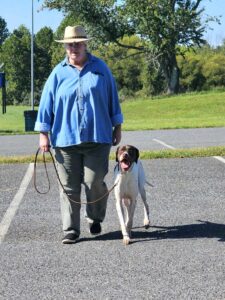The lack of ethics in dog training is becoming a major concern. There are almost daily reports of people masquerading as trainers or other canine caregivers being arrested and charged with multiple counts of cruelty. Animal concentric professions are being aggressively scrutinized by lawmakers due to the growing reports and indictments of cruelty nationwide as a result.
Several recent, absolutely heinous videos have surfaced of folks calling themselves trainers blatantly abusing dogs, physically punching, whipping, kicking and throwing dogs around like rag dolls. Several groomers have been caught on camera abusing dogs during their grooms. A veterinarian in the southwest lost their license to practice because of video evidence showing abuse of a horse with a cattle prod while in their care.
The hunting dog culture is particularly impacted by this, as small and secular as retriever and upland dog training has become in our modern times, modern training hasn’t really been accepted by hunting dog trainers. Hunting over dogs is in jeopardy as it is; it doesn’t really need help from folks that don’t understand the difference between discipline and abuse.
This behavior is not normal, nor should it ever be excused. It should be prosecuted with the same severity as every other violent crime.
My friend Jill Morstad operates Prairie K9 in Lincoln, Nebraska. She suggests that dog training is a form of public service, since it directly addresses public safety. Trained dogs aren’t running amuck in the neighborhood, traumatizing the inhabitants or raiding their trash. They aren’t running down cyclists and biting the mailman, walking his route.
Good dog training is not subjective. It can be codified, quantified, measured and tested. It is more than making Fluffy mind her manners when the guests arrive for Thanksgiving dinner, it is a matter of making Ragnar the African Boerboel mindful of his behavior whether he finds himself at the groomer, the vet or the boarding kennel. That is the power of real dog training.
Going around the horn for a minute, but stay with me- if you are or fancy yourself a horseman, this last couple years in the equine world have uncovered some horrible abuse at the top echelons of horse sport. One of my own favorite riders was caught on camera whipping a horse endlessly during a student ride. I, personally, was devastated. It ruined the whole experience of what I perceived as the epitome of horsemanship for me. I knew there were issues in the sport, there’s issues in every sport, but I didn’t know to what extent until the last year or so. This was more than just a fall from grace. It was sacrilege.
I do not, nor will I ever agree, that folks need to use pain or fear to leverage any behavior from an animal. As Bart Bellon of NePoPo fame point out in his training, ethical considerations must be our primary concern. It’s not just front-facing towards the viewing public, but in all things regarding dogs and their training, even when we think nobody is watching.
But ethics aren’t just what we shouldn’t do to dogs, it’s also what we shouldn’t do to people. Owners, clients, other trainers, even ourselves.
You’ll see where I’m headed right about… now…
There is a concept in the corporate world called ‘SLO’. It stands for ‘Social License to Operate’, which is a concept that describes the extent to which a company, industry or project is perceived as acceptable by the stakeholders, employees and public.
It’s not a legal document, but a relationship based on perception and trust, which can and should evolve. It reflects broader recognition and acceptance, which can mean anything from complete rejection to subscribing to the culture and immersive participation. SLO requires engagement to be successful.
You don’t create an SLO, as much as you earn it…
…by building relationships based on mutual trust, respecting goals and values, creating tangible benefits, and providing effective ways to address concerns.
This is good social engineering, and totally within our individual capacity to impact.
If you are a professional in the animal trades, you are a stakeholder in how our trade is percieved. What others do or don’t do, profoundly affects us all.
Recently, in a group of what I thought were other stakeholders, a topic of conversation was redirected from one of service to one of compensation. My argument was that since compensation had already occurred, just finish what had already been started. Based on the individual’s lack of discovery prior to accepting the ‘project’, frustration developed because the primary party didn’t feel they were going to be adequately compensated for what they perceived as additional work. Others chimed in that this particular issue was not a service they provided, and down the rabbit hole we went.
But, dog training isn’t ‘ala carte’. We don’t train problems, we train dogs with problems. It’s like spot dieting. I’m not going to lose fat off my bucket ass by just putting the potato chips down. I have to add resistance training and modify my caloric intake to reflect more bioavailable foods which will reduce insulin resistance, etc.
Dog training is also greater than a sum of its parts. The synergy required to make it effective isn’t a patchwork of simple exercises. It’s a merging of skills and understanding that establish an elastic, vibrant connection between human and animal.
I find it sad that there are individuals who honestly believe dog behavior issues are singular and stand alone.
After over 50 years, I can unequivocally state that is simply not true.
The four ‘pillars’ of SLO are legitimacy, which the dog training trade struggles with, transparency, which is a reflection of a person’s uncertainty over their own skill (sort of the whole ‘fake it til you make it’ thing), communication, which I see as a big flaw in many trades. Finally, trust. I see it as the end result of the first three. Meet those first three needs, and the rest follows.
The dog trainer trade has a huge trust issue. Frequenting some of the dog trainer social media hangouts, it’s easy to see why. Big interest in how to make money. Not enough in improving skill or how to elevate the public’s view of what dog training actually is.
Lots of lip service to ‘relationship’ building, but little in the way of building better relationships between our job, that of dog trainer, and the public perspective, which is weakening with every accusation and every successful litigation.
Employees are a huge function of any business. They are the front-facing element that we as business owners can only control so far. Who we become through our reputation teeters on the fulcrum of our values and ultimately, theirs. Treat your employees well. Select carefully, cull ruthlessly. If you cannot trust your employees, don’t have them. Your business is your garden. Don’t neglect it by leaving it to others to tend. Employees won’t have the same compassion for your business as you should. All it takes is one disgruntled employee to ruin an otherwise great day. Or a reputation.
The public. Our raison d’etre. They have been traumatized, cajoled, lied to, deceived, stolen from, harmed and ignored by stakeholders and their employees for years. The level of skepticism I hear in the voices of folks that have encountered other trainers is deafening.
When every community group on FaceBook is filled with wannabes offering cheap care in this uncertain economy, folks cling to the hope that they won’t get screwed and their dog won’t get hurt. These folks know all the buzzwords to get a concerned pet owner to click that call-to-action because they know how easy it is to snow a person with no experience, even if they have very little of their own. I see it every day.
When clients get in over their head and actively seek legitimate training help, they are treated with indifference and charged a kings’ ransom for something that shouldn’t take more than a session or two to address. Trainers tend to make mountains out of molehills, or are riddled with such a depth of incompetence that they create bigger problems than they started with.
I understand charging what my time is worth, but I don’t understand this need to gouge people for services that can be resolved in a couple hours at most.
It is our job to help owners understand why their perceptions of their dogs’ behavior could be entirely different than ours as they negotiate costs, but telling them why can be done kindly. Certainly, if my prospective client has a dog with serious behavioral concerns, I am going to provide them with options I am morally and ethically comfortable with, and allow them the latitude to make an informed decision.
I don’t have to take that client and they don’t have to hire me. Those are the rules. I allow them the opportunity to decide if I and my philosophies aligns with their values and goals.
Good dog training is self-evident. Good dog training keeps dogs in homes. It should elevate the profession if we all adhered to the same standard of care and started holding each other accountable.
Good luck out there.

